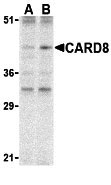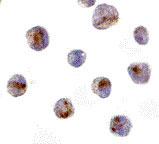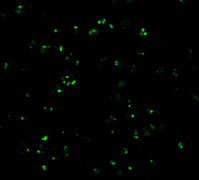CARD8 Antibody
- SPECIFICATION
- CITATIONS
- PROTOCOLS
- BACKGROUND

Application
| WB, IF, ICC, E |
|---|---|
| Primary Accession | Q9Y2G2 |
| Other Accession | AAG50014, 12247742 |
| Reactivity | Human |
| Host | Rabbit |
| Clonality | Polyclonal |
| Isotype | IgG |
| Calculated MW | 60652 Da |
| Application Notes | CARD8 antibody can be used for detection of CARD8 by Western blot at 2 and 4 µg/mL. An approximate 45 kDa can be detected. Antibody can also be used for immunocytochemistry starting at 10 µg/mL. For immunofluorescence start at 20 µg/mL. |
| Gene ID | 22900 |
|---|---|
| Other Names | CARD8 Antibody: NDPP, DACAR, DAKAR, NDPP1, TUCAN, CARDINAL, KIAA0955, Caspase recruitment domain-containing protein 8, Apoptotic protein NDPP1, caspase recruitment domain family, member 8 |
| Target/Specificity | CARD8; |
| Reconstitution & Storage | Antibody can be stored at 4°C up to one year. Antibodies should not be exposed to prolonged high temperatures. |
| Precautions | CARD8 Antibody is for research use only and not for use in diagnostic or therapeutic procedures. |
| Name | CARD8 {ECO:0000303|PubMed:11821383, ECO:0000312|HGNC:HGNC:17057} |
|---|---|
| Function | Inflammasome sensor, which mediates inflammasome activation in response to various pathogen-associated signals, leading to subsequent pyroptosis of CD4(+) T-cells and macrophages (PubMed:11821383, PubMed:11408476, PubMed:15030775, PubMed:32840892, PubMed:32051255, PubMed:33542150, PubMed:34019797, PubMed:36357533). Inflammasomes are supramolecular complexes that assemble in the cytosol in response to pathogens and other damage-associated signals and play critical roles in innate immunity and inflammation (PubMed:11821383, PubMed:11408476, PubMed:15030775, PubMed:36357533). Acts as a recognition receptor (PRR): recognizes specific pathogens and other damage-associated signals, such as HIV-1 protease activity or Val- boroPro inhibitor, and mediates CARD8 inflammasome activation (PubMed:32840892, PubMed:33542150, PubMed:36357533). In response to pathogen-associated signals, the N-terminal part of CARD8 is degraded by the proteasome, releasing the cleaved C-terminal part of the protein (Caspase recruitment domain-containing protein 8, C-terminus), which polymerizes to initiate the formation of the inflammasome complex: the CARD8 inflammasome directly recruits pro-caspase-1 (proCASP1) independently of PYCARD/ASC and promotes caspase-1 (CASP1) activation, which subsequently cleaves and activates inflammatory cytokines IL1B and IL18 and gasdermin-D (GSDMD), leading to pyroptosis (PubMed:33053349, PubMed:32840892, PubMed:32051255, PubMed:33542150, PubMed:36357533). Ability to sense HIV-1 protease activity leads to the clearance of latent HIV-1 in patient CD4(+) T-cells after viral reactivation; in contrast, HIV-1 can evade CARD8-sensing when its protease remains inactive in infected cells prior to viral budding (PubMed:33542150). Also acts as a negative regulator of the NLRP3 inflammasome (PubMed:24517500). May also act as an inhibitor of NF- kappa-B activation (PubMed:11551959, PubMed:12067710). |
| Cellular Location | Cytoplasm. Nucleus |
| Tissue Location | High expression in lung, ovary, testis and placenta (PubMed:11551959). Lower expression in heart, kidney and liver (PubMed:11551959). Also expressed in spleen, lymph node and bone marrow (PubMed:11821383). |

Thousands of laboratories across the world have published research that depended on the performance of antibodies from Abcepta to advance their research. Check out links to articles that cite our products in major peer-reviewed journals, organized by research category.
info@abcepta.com, and receive a free "I Love Antibodies" mug.
Provided below are standard protocols that you may find useful for product applications.
Background
CARD8 Antibody: Apoptosis is related to many diseases and development. Cell death signals are transduced by death domain (DD), death effector domain (DED), and caspase recruitment domain (CARD) containing molecules. CARD containing proteins include some caspases, Apaf-1, CARD4, IAPs, RICK, ARC, RAIDD, BCL-10, and ASC. A novel CARD-containing protein was recently identified and designated CARD8. This protein interacts with DRAL, a p53-responsive protein implicated in the induction of apoptosis, and caspase-1 and its related proteins ICEBERG and pesudo-ICE. Although there are conflicting reports on whether CARD8 acts a pro- or anti-apoptotic protein, it has been suggested that it functions as an adaptor molecule regulating caspase-1 and NF-κB activation.
References
Scholl FA, McLoghlin P, Ehler E, et al. DRAL is a p53-responsive gene whose four and a half LIM domain protein product induces apoptosis. J. Cell Biol. 2000; 151:495-506.
Stil R, Leonardi A, Formisano L, et al. TUCAN/CARDINAL and DRAL participate in a B activation. FEBS 2002;kcommon pathway for modulation of NF- 521:165-9.
Razmara M, Srinivasula SM, Wang L, et al. CARD-8 protein, a new CARD family member that regulates caspase-1 activation and apoptosis. J. Biol. Chem. 2002; 277:13952-8.
Pathan N, Marusawa H, Krajewska M, et al. TUCAN, an antiapoptotic caspase-assoicated recruitment domain family protein overexpressed in cancer. J. Biol. Chem. 2001; 276:32220-9.
If you have used an Abcepta product and would like to share how it has performed, please click on the "Submit Review" button and provide the requested information. Our staff will examine and post your review and contact you if needed.
If you have any additional inquiries please email technical services at tech@abcepta.com.













 Foundational characteristics of cancer include proliferation, angiogenesis, migration, evasion of apoptosis, and cellular immortality. Find key markers for these cellular processes and antibodies to detect them.
Foundational characteristics of cancer include proliferation, angiogenesis, migration, evasion of apoptosis, and cellular immortality. Find key markers for these cellular processes and antibodies to detect them. The SUMOplot™ Analysis Program predicts and scores sumoylation sites in your protein. SUMOylation is a post-translational modification involved in various cellular processes, such as nuclear-cytosolic transport, transcriptional regulation, apoptosis, protein stability, response to stress, and progression through the cell cycle.
The SUMOplot™ Analysis Program predicts and scores sumoylation sites in your protein. SUMOylation is a post-translational modification involved in various cellular processes, such as nuclear-cytosolic transport, transcriptional regulation, apoptosis, protein stability, response to stress, and progression through the cell cycle. The Autophagy Receptor Motif Plotter predicts and scores autophagy receptor binding sites in your protein. Identifying proteins connected to this pathway is critical to understanding the role of autophagy in physiological as well as pathological processes such as development, differentiation, neurodegenerative diseases, stress, infection, and cancer.
The Autophagy Receptor Motif Plotter predicts and scores autophagy receptor binding sites in your protein. Identifying proteins connected to this pathway is critical to understanding the role of autophagy in physiological as well as pathological processes such as development, differentiation, neurodegenerative diseases, stress, infection, and cancer.




